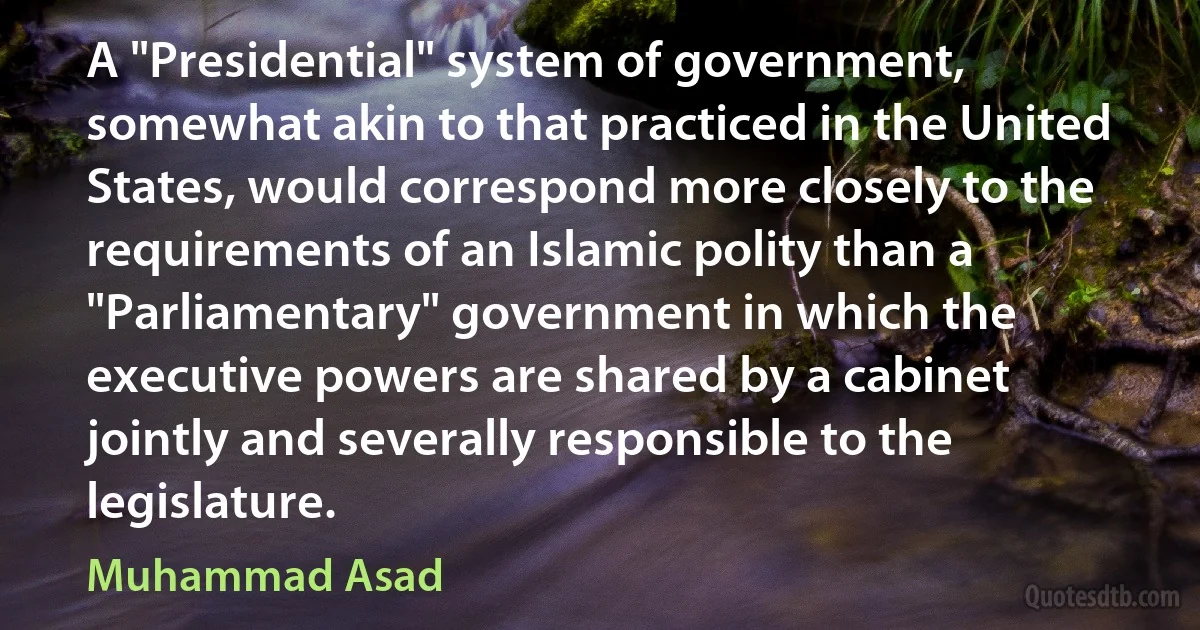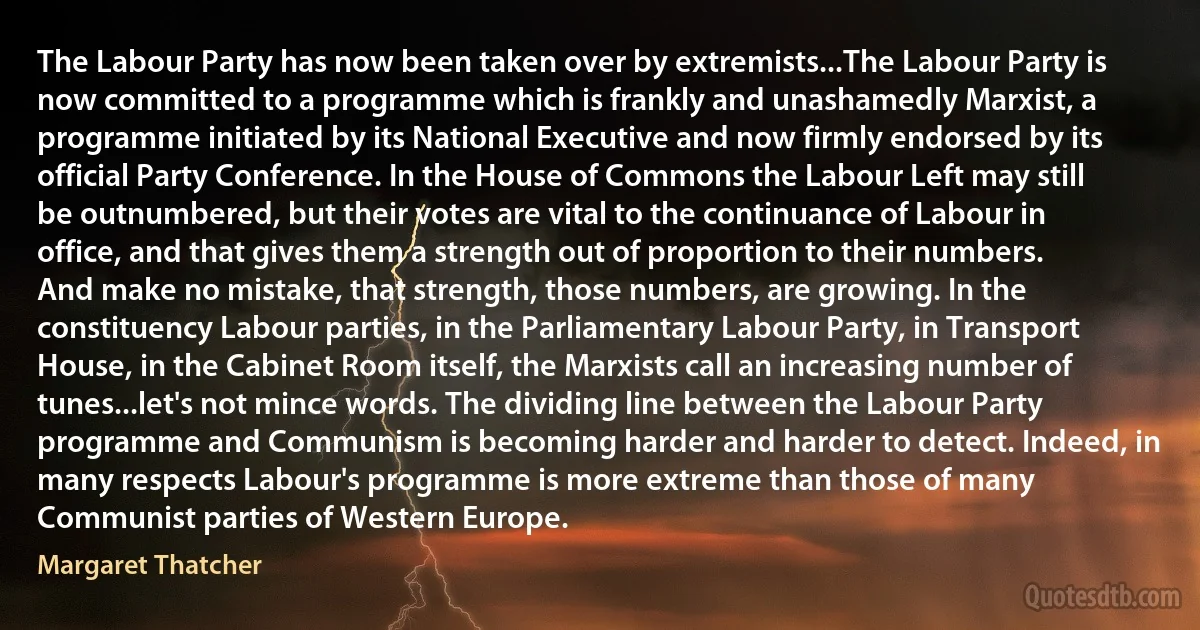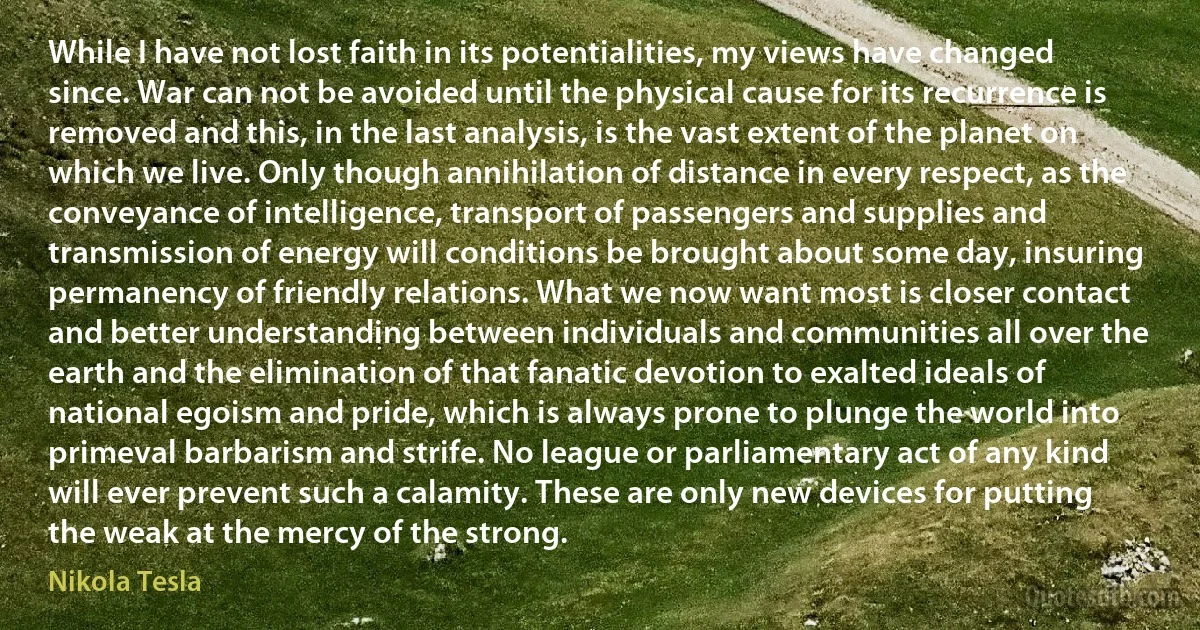Parliamentary Quotes - page 4
When I called the Right Hon. Member for Plymouth, Devonport (Dr. Owen) a pompous sod, Mr. Speaker said to me, 'You had better withdraw that'. I said I would withdraw 'pompous', but said, Mr. Speaker 'That's not the word I'm looking for.' There was laughter in the House and everyone thought that I had hit the nail on the head. I thought that that was a real parliamentary triumph, but Mr. Speaker thought differently. He said, 'Off you go,' and I did not get a chance to reply.

Dennis Skinner
The nation and the government in Germany are one thing. The will of the people is the will of the government and vice versa. The modern structure of the German State is a higher form of democracy [ennobled democracy] in which, by virtue of the people's mandate, the government is exercised authoritatively while there is no possibility for parliamentary interference to obliterate and render ineffective the execution of the nation's will.

Joseph Goebbels
...the following passage from Major Cartwright's Memorandum Book: "On Sunday the 10th of April, 1814, Earl Stanhope informed me that in conversation with Mr. Fox and a third person, Mr. Fox said ‘Parliamentary reform was a fit thing to be made use of in argument in the House of Commons, but not to be carried into execution.'” Lord Stanhope also mentioned the same fact to Major Cartwright's friend, Mr. Holt White, and in the same words.

Charles James Fox
As it developed in the late eighteenth and early nineteenth centuries, the intellectual movement that went under the name of liberalism emphasized freedom as the ultimate goal and the individual as the ultimate entity in the society. It supported laissez faire at home as a means of reducing the role of the state in economic affairs and thereby enlarging the role of the individual; it supported free trade abroad as a means of linking the nations of the world together peacefully and democratically. In political matters, it supported the development of representative government and of parliamentary institutions, reduction in the arbitrary power of the state, and protection of the civil freedoms of individuals.

Milton Friedman
When you (President Ratu Sir Penaia Ganilau) called me at Lomaloma in December 1987 and asked me to form an Interim Government to prepare the country for a return to parliamentary rule, I knew the task at hand would be onerous. Fiji had experienced the ordeal of two military coups. Society was fractured, the economy was tottering and the country had been ostracised by some of its oldest friends and allies. There was no Parliament and no properly functioning political system. Even institutions of State, such as the judiciary, were seriously weakened, to the extent that the citizenry justifiably feared a breakdown in law and order. The business community was hit by a slump in sales and confidence, leading to reduced earnings and loss of jobs.

Kamisese Mara
Too many crucial things about this country turn out to be highly recommended because they are 'invisible'. There is the 'hidden hand' of the free market, the 'unwritten' Constitution, the 'invisible earnings' of the financial service sector, the 'magic' of monarchy and the 'mystery' of the Church and its claim to the interpretation of revealed truth. When we do get as far as the visible or the palpable, too much of it is deemed secret. How right it is that senior ministers, having kissed hands with the monarch, are sworn to the cult of secrecy by 'The Privy Council Oath'. How right it is that our major foreign alliance - the 'special relationship' with the United States - is codified by no known treaty and regulated by no known Parliamentary instrument.

Christopher Hitchens
Parliamentary government is simply a mild and disguised form of compulsion. We agree to try strength by counting heads instead of breaking heads, but the principle is exactly the same... The minority gives way not because it is convinced that it is wrong, but because it is convinced that it is a minority.

James Fitzjames Stephen
We all of us made our mistakes, but the strength of the Parliamentary institution has been shown to enable it at the same moment to preserve all the title-deeds of democracy while waging war in the most stern and protracted form. I wish to give my hearty thanks to men of all Parties, to everyone in every part of the House wherever they sit, for the way in which the liveliness of Parliamentary institutions has been maintained under the fire of the enemy, and for the way in which we have been able to persevere-and we could have persevered much longer if need had been-till all the objectives which we set before us for the procuring of the unlimited and unconditional surrender of the enemy had been achieved.

Winston Churchill
America should have minded her own business and stayed out of the World War. If you hadn't entered the war the Allies would have made peace with Germany in the Spring of 1917. Had we made peace then there would have been no collapse in Russia followed by Communism, no breakdown in Italy followed by Fascism, and Germany would not have signed the Versailles Treaty, which has enthroned Nazism in Germany. If America had stayed out of the war, all these 'isms' wouldn't today be sweeping the continent of Europe and breaking down parliamentary government - and if England had made peace early in 1917, it would have saved over one million British, French, American, and other lives.

Winston Churchill
The dictator Powers of Europe are striding on from strength to strength and from stroke to stroke, and the parliamentary democracies are retreating abashed and confused. ... Austria has been laid in thrall, and we do not know whether Czechoslovakia will not suffer a similar attack. ... It is because we have lost these opportunities of standing firm, of having strong united forces and a good heart, and a resolute desire to defend the right and afterwards to do generously as the result of strength; it is because we have lost these successive opportunities which have presented themselves, that, when our resources are less and the dangers greater, we have been brought to this pass. I predict that the day will come when at some point or other on some issue or other you will have to make a stand, and I pray God that when that day comes we may not find that through an unwise policy we are left to make that stand alone.

Winston Churchill
There is a great danger that the Parliamentary nations and merciful, tolerant forces in the world will be knocked out quite soon by the heavily armed, unmoral dictatorships. But I believe there is still time to organise a European mass, and perhaps a world mass which would confront them, overawe them, and perhaps let their peoples loose upon them.

Winston Churchill
You cannot choose between party government and Parliamentary government. I say, you can have no Parliamentary government if you have no party government; and, therefore, when Gentlemen denounce party government, they strike at that scheme of government which, in my opinion, has made this country great, and which I hope will keep it great.

Benjamin Disraeli
The mortal sin of the Second International was not that it pursued at that time the tactics of utilising parliamentary forms of struggle, but that it overestimated the importance of these forms, that it considered them virtually the only forms; and that when the period of open revolutionary battles set in and the question of extra-parliamentary forms of struggle came to the fore, the parties of the Second International turned their backs on these new tasks, refused to shoulder them.

Joseph Stalin
I have been a Member of Parliament for 18 years. I have been a member of the Government for 14 years, of the Cabinet for ten years and Prime Minister since 1990. When the curtain falls it is time to get off the stage and that is what I propose to do. I shall, therefore, advise my parliamentary colleagues that it would be appropriate for them to consider the selection of a new leader of the Conservative Party to lead the party through Opposition through the years that lie immediately ahead.

John Major
Does Madison's belief that separation of powers is necessary to prevent tyranny necessarily require a presidential system or even judicial review? As I pointed out, this reading makes Madison silly, or at least a casualty of historical developments, since almost all other democratic countries have rejected the first and some the second. Of course, like all others of his time Madison had to make judgments about constitutional arrangements with very little directly relevant historical experience to go on. Hindsight gives us the advantage of nearly two centuries of later experience, during which most of the stable democracies adopted a parliamentary system, only a few chose a presidential system, and none adopted the American presidential system.

Robert A. Dahl
The Enabling Law permitted the government to pass budgets and promulgate laws, including those altering the constitution, for four years without parliamentary approval. In democracies, constitutional amendments are especially solemn moments; here they were easier than changing the traffic regulations. None of the guarantees Hitler extended to the Churches or the judiciary in his address to the Reichstag amounted to a hill of beans.

Michael Burleigh



